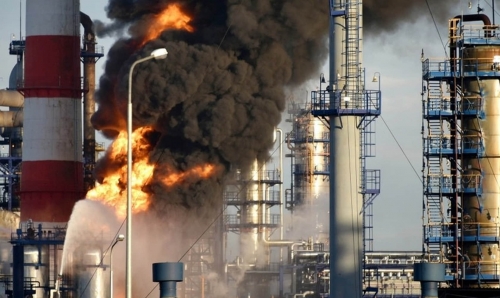Oil prices slid 5 percent on Wednesday to a one-month low, after an unexpected increase in U.S. inventories of crude and gasoline fanned fears that output cuts by major world oil producers have not done much to drain a global glut.
Crude stocks in the United States grew 3.3 million barrels to 513 million barrels, according to the U.S. Energy Information Administration (EIA). That confounded forecasters who had predicted a drop of 3.5 million barrels, especially a day after data from the American Petroleum Institute indicated an even bigger fall.
Gasoline inventories also unexpectedly rose, imports increased, and exports dropped, the EIA data showed.
“These figures spell a setback to the joint effort by OPEC and some non-OPEC countries to curb their output," said Abhishek Kumar, senior energy analyst at Interfax Energy’s Global Gas Analytics in London.
"However, without persistent drawdowns in U.S. oil stockpiles, the process could be painfully slow.”
U.S. crude futures settled down 5 percent, or $2.47 a barrel, at $45.72 a barrel, the lowest settlement for U.S. crude since May 4. U.S. benchmark futures CLc1 have slid more than 11 percent in 10 days of trading.
Brent crude prices LCOc1 fell $2.06, or 4 percent to settle at $48.06 a barrel. Official settlement prices were delayed due to a technical issue, according to a Nymex spokesperson.
Gasoline futures 1RBc1 tumbled 4 percent to $1.4921 a gallon, lowest since May 10, as rising inventories fed worries about weak demand. Overall gasoline demand is down 0.7 percent for the past four weeks from a year ago, the EIA said.
"Flagging gasoline demand continues to bedevil the market. With gasoline currently the seasonal leader of the complex, its weakness is dragging everything down," said John Kilduff, partner at Again Capital in New York.
Some in the market remained concerned about the move by OPEC members Saudi Arabia and the United Arab Emirates to cut diplomatic and transport ties with Qatar, an OPEC member that had agreed to cut about 30,000 barrels a day as part of the Organization of the Petroleum Exporting Countries agreement to reduce output.
ome analysts saw a risk that rivalries between OPEC members could weaken the production cut agreement. Some were concerned about rising production from Libya and Nigeria, which are exempt from the agreement.
OPEC and other producers including Russia have pledged to cut output by about 1.8 million barrels per day (bpd).
Royal Dutch Shell (RDSa.L) lifted force majeure on exports of Nigeria's Forcados crude oil, bringing all the country's oil exports fully online for the first time in 16 months.

%20(1).png)



